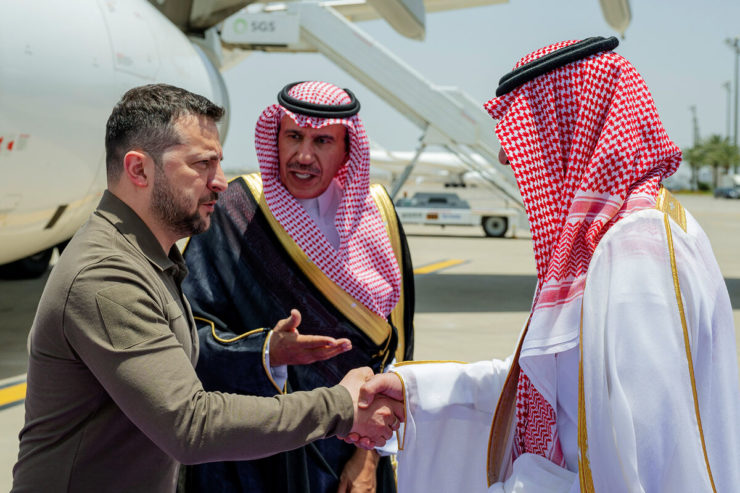
On August 5–6, 2023, Jeddah hosted the second international meeting of advisers to heads of state and representatives of the Ministry of Foreign Affairs regarding the Peace Formula. Saudi Arabia, which served as the event’s host, gathered delegates from 42 nations on the sidelines of its platform and secured the participation of China, which is considered Russia’s main partner in the Middle East. Despite the fact that the two days of consultations resulted in no breakthroughs, the Saudi media and community of experts universally hailed the meeting as a success. And in the case of the KSA these are not empty words. The Jeddah meeting was not merely a fleeting diplomatic engagement.
The Jeddah meeting of advisers was targeted first and most obviously at demonstrating Saudi Arabia’s diplomatic ability and ensuring that it is viewed as a nation that promotes peace and security. It is about promoting a new image of Saudi Arabia under the leadership of Crown Prince Mohammed bin Salman that positions Riyadh as a key player in the global diplomatic arena, working at the peak of its capabilities in efforts to address key challenges.
The question of betting on “positive neutrality” is raised by the KSA’s ambitious self-positioning. It is stressed that the KSA is more devoted to the idea of neutrality than any other country, from which it can operate as an effective mediator. According to Saudi officials, the optimistic tone of the Saudi discourse stems from the KSA’s desire to protect the security of other nations by resolving the Ukrainian crisis. The leadership of other states will be motivated to engage in peacekeeping operations by Riyadh’s example. The Kingdom regards itself as a member of a sort of neutral society that also consists of numerous African and Latin American states, as well as India and South Africa. Such a strategy presupposes the existence of a group of powerful nations that choose to remain neutral and pursue cooperative relations with both Russia and Ukraine.
According to Saudi observers, the Russia-Ukraine conflict was at a standstill as of the beginning of August 2023 because neither side could secure a decisive victory and accomplish its stated objectives. Although Riyadh is aware that the Russian army has put a stop to the Ukrainian counteroffensive, it is confident that Russia would not launch an offensive to take the upper hand in the standoff. The Saudi experts were especially impressed by the drone attacks on Moscow. It is plausible for one to speculate that the KSA’s own painful experience with drone and ballistic missile strikes from Yemeni territory might have played a role.
There is also a desire among Saudis not just to demonstrate shared concern with the Russian Federation but also to evaluate the justification of Russian leadership actions. According to Riyadh, Moscow is not battling for survival but is mired in an unsuccessful military adventure, similar to the KSA’s Yemen campaign, from which it is possible to exit if a certain, albeit hefty, political and economic price is paid. According to popular belief, the primary factor in the settlement is President Vladimir Putin’s personal status, who apparently cannot withdraw from the armed conflict without succeeding since he would lose face otherwise. This evaluation of what is going on may be regarded as disputable, but it effectively reflects the peculiarities of Arab political culture, with its often overwhelming devotion to the figure of the leader.
Meanwhile, many Arabs watching are wary of predicting a further escalation of the violence despite the front-line deadlock. Both the “war of the ports” started in the Black Sea and the prospective tanker conflict, of which Gulf Arabs have been aware since the 1980s, are very worrying. The potential deployment of tactical nuclear weapons and the open engagement of NATO nations in the conflict particularly worry the Saudis. The resulting conclusion is that if other nations do not make an effort and come up with some “creative” solutions, the conflict will continue to escalate for a very long time, posing new threats and difficulties.
The presence of delegates from more than 40 nations in Jeddah has been described as a clear indication of how many international parties want the crisis to end. Riyadh sees the visit of the PRC’s representatives as a signal to Moscow that even Russia’s de facto allies are looking forward to peace.
Even if the chances for the fulfillment of Saudi peacekeeping plans are uncertain, the meeting in Jeddah was unmistakably a validation of the trend toward multipolarity. The countries of the Global South, which made up the majority at the summit, are increasingly vocal about their position. Potential leaders stand out among them more and more, indicating a desire to take on a more significant role in international affairs and assume accountability for upholding world security. The viability of this approach, however, hinges on Riyadh’s ability to comprehend the strategic objectives of the Russian Federation in the current crisis and the challenges that led it to initiate the Special Military Operation.
Madi Khalis Maalouf, a political observer, exclusively for the online magazine “New Eastern Outlook”